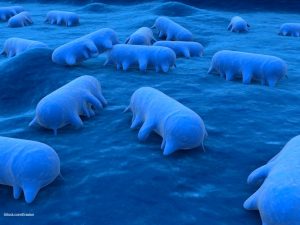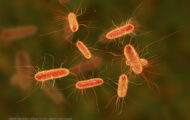The FDA has released a Compliance Policy Guide on Salmonella contamination in food for animals. The agency claims that they are “targeting resources more effectively to protect the health of both animals and humans”
 Because pet food is often handled by consumers, those products are considered contaminated if they contain Salmonella bacteria. The products include dog and cat foods, aquarium fish foods, treats, chews, nutritional supplements, and other pet products.
Because pet food is often handled by consumers, those products are considered contaminated if they contain Salmonella bacteria. The products include dog and cat foods, aquarium fish foods, treats, chews, nutritional supplements, and other pet products.
But for livestock and horse feeds, the risk-based enforcement policy is focusing only on certain strains of Salmonella. The press release states “because people are much less likely to come into direct contact with animal feeds, FDA is most concerned about the strains of Salmonella that are capable of causing disease in the animal for which the feed is intended. This is a change from a rule that was put in place in 1967.
But according to veterinarians at Cornell University, “all Salmonella strains affect most vertebrates and can jump between species. Even carriers that don’t seem sick can shed bacteria, and people, companion animals, and other livestock can pick up the infection through contact with any bodily excretion.”
And a study published in 2002 in Clinical Infectious Diseases states that “animal feed is at the beginning of the food safety chain in the ‘farm-to-fork’ model.” They also state that animal feed that is contaminated with non-Typhi serotypes of Salmonella enterica can lead to infection of animals, which contaminate animal carcasses at slaughter, leading to human illness. In fact, several large outbreaks have been traced back to contaminated animal feed. Food producing animals are the major reservoir of non-Typhi serotypes of Salmonella enterica. Before its introduction to the U.S. in animal feed in 1968, Salmonella Agona outbreaks were almost non-existent.





What are they trying to do? I mean, if there is a threat or risk for getting the bacteria then every measure should be taken to make sure that they don’t transfer or enter into the human body. They shouldn’t be allowing bacteria on the feeds. This is part of prevention.
Is there somewhere we can email or write a letter to complain about this policy? I only use small batch chicken feed, but I certainly want to make sure it is safe for me and my family!
OMG what a crock. Apparently these idiots never mix feed. My hands are in it twice a day mixing in soaked alfalfa and supplements, etc. for 19 horses. I don’t know of a farmer or rancher that doesn’t come into contact with the feed. Truly our government is out to poison the globe on every turn. IDIOTS.